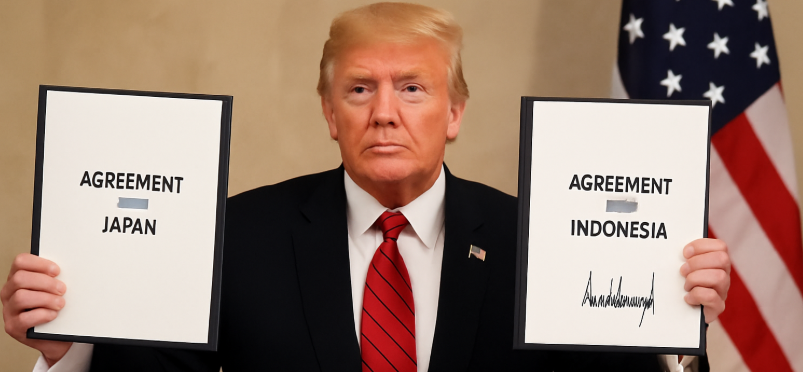President Trump has redefined global trade diplomacy by securing multiple major trade deals in a single day—with Japan, the EU, the Philippines, and Indonesia all agreeing to open their markets to American goods. These landmark agreements aim to bring back manufacturing, boost U.S. agriculture, and generate hundreds of billions in investments. This blog breaks down how Trump’s strategy is reshaping the global trade landscape, sidelining China’s tactics, and signaling a new era of American leverage in international economics.
Trump Strikes Major Trade Deals with Japan, EU, Philippines & Indonesia in One Day
In what may be remembered as a defining moment for U.S. trade policy, President Donald Trump has pulled off an aggressive push on the global trade chessboard by brokering a flurry of trade deals in just one day—bringing nations like Japan, the European Union, Canada, Mexico, the Philippines, and Indonesia closer to Washington’s strategic economic framework.
President Trump, addressing the press and public, confidently declared that for the first time ever, countries like the Philippines and Indonesia have agreed to open up their markets to American goods and services. These moves form part of a larger vision to ensure that America is no longer “ripped off” in international trade and instead rebalances the entire ecosystem of global trade relations.
Among the key breakthroughs, Japan emerged as a cornerstone of this restructuring. Despite its ongoing political turbulence, the Japanese leadership prioritized this trade deal with the United States, injecting a fresh momentum into bilateral economic relations. According to Trump, Japan’s commitment includes a massive investment inflow into the U.S. amounting to around $550 billion, which is expected to create jobs, stimulate new businesses, and bolster America’s industrial base.
These investments and access agreements are not just about finance—they’re about impact on everyday Americans. For example, U.S. auto manufacturers like Chevrolet could finally gain substantial access to Japanese markets, historically closed to foreign carmakers. American farmers, especially rice producers, also stand to benefit as Japan agreed to buy more U.S. agricultural goods.
Indonesia, though a smaller economy compared to Japan, signed on late last week and symbolically aligned itself with the U.S. vision of fair trade. With a tariff barrier of nearly 19%, Indonesia’s willingness to open its economy sets a precedent in Asia. This move also serves a tactical purpose—curbing China’s attempts to bypass U.S. trade barriers by rerouting products through smaller Asian economies like Laos and Vietnam. With these deals, the U.S. has effectively boxed China in, undermining its trade circumvention strategies and reinforcing the message that fair, direct trade is the new norm.

On the horizon is a potential deal with the European Union. Senior EU officials are already in the U.S. for negotiations, and there is buzz around a possible $30 billion package ready for deployment if talks succeed. The Trump administration is signaling a shift from threats to results—asserting that the era of tolerance for imbalanced trade practices has ended and deal-making has truly begun.
This aggressive and fast-paced trade diplomacy has turned the previous economic narrative on its head. Financial news outlets like Axios acknowledge that President Trump has reshaped trade war psychology itself. Market participants and manufacturers are now adapting to a new norm where double-digit tariffs aren’t just a bluff but a baseline, and it’s not as devastating as critics once feared. Over $100 billion in tariff revenue has already poured in, with projections suggesting trillions in revenue over a decade.
In a major takeaway, the stock markets in both the U.S. and Japan responded positively to the announcements. The Dow and S&P surged while Japan’s markets also jumped, signaling investor confidence that these deals are good for business and economic growth.
At the heart of this trade revolution is a simple message—America is the market everyone wants access to. According to Trump and trade commentators like Charles Payne, this leverage is now being used to restore manufacturing, attract investment, and prepare America’s industrial base for the future.
Looking ahead, Charles Payne announced a special broadcast titled “Unbreakable Investor,” exploring what’s even bigger than AI—human longevity. Featuring guests like Dr. Oz and the so-called godfather of longevity, the show aims to explore how living longer will reshape everything from personal finance to healthcare.
But in the immediate term, Trump’s art of the deal appears to be delivering. From new market access to an industrial reboot, America’s trade outlook has transformed rapidly in just one day, backed by global partners finally coming to the table on Washington’s terms.

